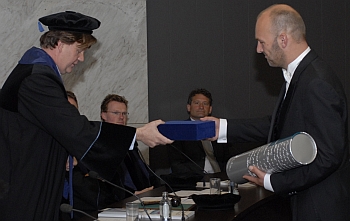Organisational flexibility in turbulent times
 On June 23, <link people niels-van-der-weerdt _blank>Niels van der Weerdt has defended his PhD thesis entitled “<link erim events _blank>Organizational Flexibility for Hypercompetitive Markets”. How can firms develop flexible organisations? While facing fierce competition, do flexible firms really perform better? Niels van der Weerdt focuses on the ability of organisations to adapt itself to an increasingly turbulent business environment. He investigates the following questions. How can firms develop flexible organisations? How does firm size affect the flexibility of the organisation and its potential to profit? The effects of high flexibility on company performance are demonstrated using a database containing rich information on the flexibility of more than 1900 companies.
On June 23, <link people niels-van-der-weerdt _blank>Niels van der Weerdt has defended his PhD thesis entitled “<link erim events _blank>Organizational Flexibility for Hypercompetitive Markets”. How can firms develop flexible organisations? While facing fierce competition, do flexible firms really perform better? Niels van der Weerdt focuses on the ability of organisations to adapt itself to an increasingly turbulent business environment. He investigates the following questions. How can firms develop flexible organisations? How does firm size affect the flexibility of the organisation and its potential to profit? The effects of high flexibility on company performance are demonstrated using a database containing rich information on the flexibility of more than 1900 companies.
The findings of this research project demonstrate how components of organizational flexibility, such as organizational structure, organizational culture, and managerial dynamic capabilities, all contribute to increasingly higher-order types of organisational flexibility. This insight informs managers about the minimum scope of interventions required to develop various types of organizational flexibility.
Furthermore, the findings support managers in decision-making concerning the optimal composition of the flexibility mix to achieve high performance in unpredictable and/or dynamic market conditions. Particularly, the findings demonstrate the superior effectiveness of operational flexibility, as compared to strategic flexibility, in markets that are predictable to some extent, whereas unpredictable markets call for strategic flexibility above all.
About Niels van der Weerdt:
Niels van der Weerdt was born in Amsterdam in 1972 and has been involved in research at the Rotterdam School of Management, Erasmus University since 1997.
Working as a strategy consultant for NetMarketing, a small consulting firm focusing on e-business strategies, he came to see many different kinds of organisations and developed an interest and fascination for organisations and their struggles to survive and prosper in competitive environments. Having done so for a couple of years, his drive for top quality insights led him to return to his Alma Mater in 2002.
Once he joined the department of Strategy and Business Environment as full-time assistant professor, he has been acting as coordinator of various academic courses. Most prominently, under his supervision the Strategic Business Plan Course has been revamped to become a flagship course of the school.
Searching for synergies in teaching and research, Niels developed the Quick Scan Flexibility (QSF) with colleague Henk Volberda and had students apply the scan and analyse the flexibility of thousands of organisations in the Netherlands and abroad. Applying the QSF on such a broad scale, this resulted in wide dissemination of managerial knowledge within the business community and a vast database with rich information on the flexibility of a diverse set of organisations.
Several scholarly articles were presented at international conferences over the years and were submitted to top-level journals preceding the publication of this thesis.
Next to his work as an assistant professor, Niels has been involved in the application of academic knowledge in practice through his work as a project leader at the Dutch Center for Social Innovation. Furthermore, he was involved in several contract research and consulting projects. Niels lives in Rotterdam and has a daughter of five. Besides academia, he has a passion for photography.
Abstract:
This research project, which extends the literature on organisational flexibility, empirically investigates four aspects concerning the flexibility of firms. Analysis of data of over 1900 firms and over 3000 respondents shows (1) that several increasing levels of organizational flexibility can be distinguished, from operational to strategic flexibility, and these are formed by increasingly complex components of organizations. (2) Flexibility pays off particularly in unpredictable and dynamic markets. In less turbulent markets it does not pay to invest in the highest order of flexibility; operational flexibility will be more efficient, compared to strategic flexibility. (3) The assumption that smaller firms by definition are better able to develop strategic flexibility compared to larger firms, appears not to hold. Large firms are able to develop strategic flexibility as well, yet through different means. Once sufficiently flexible, large firms are better positioned to reap the benefits. The thesis further, and finally, shows (4) that firms can apply two different criteria to adjust the organization to the environment and create strategic fit: by adjusting to the requirements of their unique task environment or by adjusting to more generic institutional norms and best practices in the market. Both ways of learning to achieve a strategic fit affect each other and will in business reality exist next to each other.
More Information
Full Text of the Dissertation
Pictures of the Event


